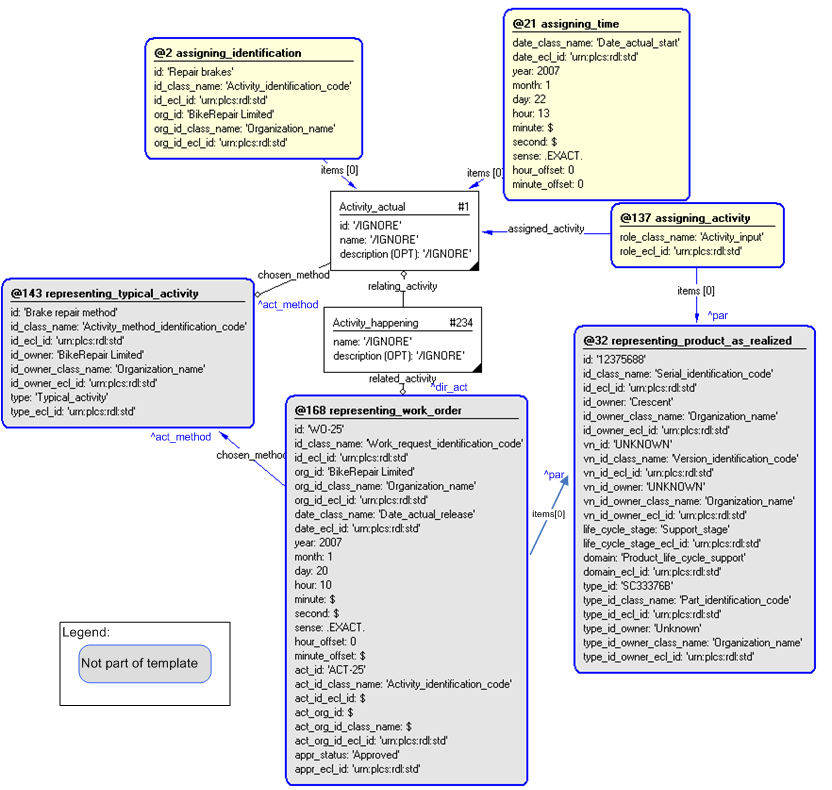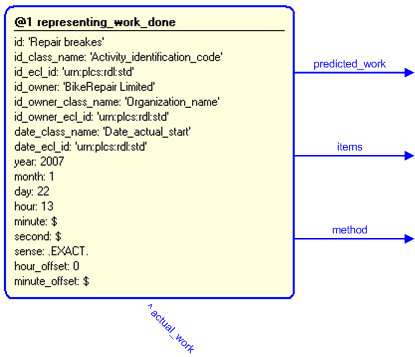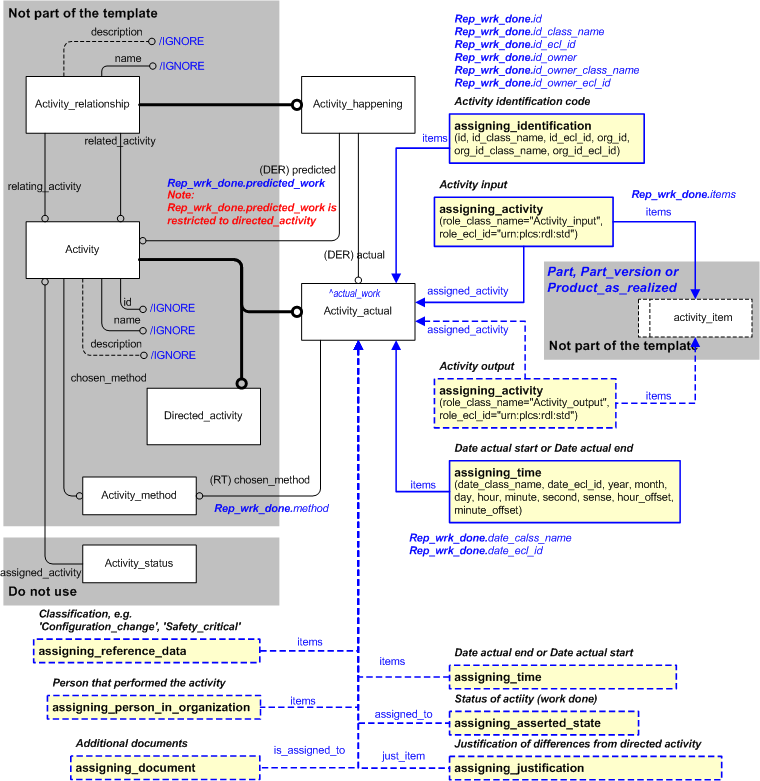
| Template:— representing_work_done (rep_wrk_done) | Date: 2008/01/18 08:58:19 Revision: 1.30 |
This section specifies the template representing_work_done.
NOTE An explanation of a template and the associated instantiation path is provided in the Template overview section.
This template describes how to represent a record of the work done to a product in response to an activity (a Directed_activity) that has been authorized by a Work_order. For further details see capability C065: representing_work_order (NB Capabilities are not documented in this release of the PLCS standard) ).
This template is used for tracking authorized activities that have been undertaken.
This template should only be used for activities that are neither performed by a product, or activities, such as configuration change activities, that have been undertaken in response to an activity (a Directed_activity) that has been authorized by a Work_order.
Where the activity is work planned to be done on a product and authorised by a Work_order, the template representing_work_order should be used.
Where the activity is planned to take place some time in the future but is not authorized by a work order i.e. directed, the template representing_planned_activity should be used.
Where the activity is a record of a usage of a product that has taken place, e.g. a sortie flown by an aircraft , the template representing_product_usage should be used.
Where the activity is a record of an activity that has taken place that is neither an authorized activity i.e. not authorized by a Work_order such as part of a directed change or technical bulletin, nor an activity performed by a product the more generic template representing_activity_actual should be used.


target
is the parameter to which the
Activity_actual
is bound.
| Entity in path | Value | Inherited from |
| Activity_actual.id | '/IGNORE' | Activity.id |
| Activity_actual.name | '/IGNORE' | Activity.name |
| Activity_actual.description | '/IGNORE' | Activity.description |
| Activity_happening.name | '/IGNORE' | Activity_relationship.name |
| Activity_happening.description | '/IGNORE' | Activity_relationship.description |

#1 = ACTIVITY_ACTUAL('/IGNORE','/IGNORE','/IGNORE',#144); #3 = IDENTIFICATION_ASSIGNMENT('Repair brakes','/IGNORE',$,(#1)); #5 = CLASSIFICATION_ASSIGNMENT(#6,(#3),'/IGNORE'); #6 = EXTERNAL_CLASS('/IGNORE','Activity_identification_code','/IGNORE',#7); #7 = EXTERNAL_CLASS_LIBRARY('urn:plcs:rdl:std',$); #9 = ORGANIZATION('/IGNORE','/IGNORE'); #11 = IDENTIFICATION_ASSIGNMENT('BikeRepair Limited','/IGNORE','/IGNORE',(#9,#152,#177,#216)); #13 = CLASSIFICATION_ASSIGNMENT(#14,(#11),'/IGNORE'); #14 = EXTERNAL_CLASS('/IGNORE','Organization_name','/IGNORE',#7); #16 = ORGANIZATION_OR_PERSON_IN_ORGANIZATION_ASSIGNMENT(#9,'/IGNORE',(#3)); #18 = CLASSIFICATION_ASSIGNMENT(#19,(#16),'/IGNORE'); #19 = EXTERNAL_CLASS('/IGNORE','Owner_of','/IGNORE',#7); #22 = DATE_OR_DATE_TIME_ASSIGNMENT(#28,'/IGNORE',(#1)); #24 = CLASSIFICATION_ASSIGNMENT(#25,(#22),'/IGNORE'); #25 = EXTERNAL_CLASS('/IGNORE','Date_actual_start','/IGNORE',#7); #28 = DATE_TIME(#29,#30); #29 = CALENDAR_DATE(2007,1,22); #30 = LOCAL_TIME(13,$,$,#31); #31 = TIME_OFFSET(0,$,.EXACT.); #33 = PRODUCT_AS_INDIVIDUAL('/IGNORE','/IGNORE','/IGNORE'); #35 = IDENTIFICATION_ASSIGNMENT('12375688','/IGNORE',$,(#33)); #37 = CLASSIFICATION_ASSIGNMENT(#38,(#35),'/IGNORE'); #38 = EXTERNAL_CLASS('/IGNORE','Serial_identification_code','/IGNORE',#7); #41 = ORGANIZATION('/IGNORE','/IGNORE'); #43 = IDENTIFICATION_ASSIGNMENT('Crescent','/IGNORE','/IGNORE',(#41)); #45 = CLASSIFICATION_ASSIGNMENT(#14,(#43),'/IGNORE'); #48 = ORGANIZATION_OR_PERSON_IN_ORGANIZATION_ASSIGNMENT(#41,'/IGNORE',(#35)); #50 = CLASSIFICATION_ASSIGNMENT(#19,(#48),'/IGNORE'); #53 = PRODUCT_AS_REALIZED('/IGNORE','/IGNORE',#33); #55 = IDENTIFICATION_ASSIGNMENT('UNKNOWN','/IGNORE',$,(#53)); #57 = CLASSIFICATION_ASSIGNMENT(#58,(#55),'/IGNORE'); #58 = EXTERNAL_CLASS('/IGNORE','Version_identification_code','/IGNORE',#7); #61 = ORGANIZATION('/IGNORE','/IGNORE'); #63 = IDENTIFICATION_ASSIGNMENT('UNKNOWN','/IGNORE','/IGNORE',(#61)); #65 = CLASSIFICATION_ASSIGNMENT(#14,(#63),'/IGNORE'); #68 = ORGANIZATION_OR_PERSON_IN_ORGANIZATION_ASSIGNMENT(#61,'/IGNORE',(#55)); #70 = CLASSIFICATION_ASSIGNMENT(#19,(#68),'/IGNORE'); #73 = PRODUCT_AS_INDIVIDUAL_VIEW('/IGNORE','/IGNORE','/IGNORE',#74,(),#53); #74 = VIEW_DEFINITION_CONTEXT('/IGNORE','/IGNORE','/IGNORE'); #76 = CLASSIFICATION_ASSIGNMENT(#77,(#74),'/IGNORE'); #77 = EXTERNAL_CLASS('/IGNORE','Support_stage','/IGNORE',#7); #80 = CLASSIFICATION_ASSIGNMENT(#81,(#74),'/IGNORE'); #81 = EXTERNAL_CLASS('/IGNORE','Product_life_cycle_support','/IGNORE',#7); #84 = PART('/IGNORE','/IGNORE','/IGNORE'); #86 = IDENTIFICATION_ASSIGNMENT('SC33376B','/IGNORE',$,(#84)); #88 = CLASSIFICATION_ASSIGNMENT(#89,(#86),'/IGNORE'); #89 = EXTERNAL_CLASS('/IGNORE','Part_identification_code','/IGNORE',#7); #92 = ORGANIZATION('/IGNORE','/IGNORE'); #94 = IDENTIFICATION_ASSIGNMENT('Unknown','/IGNORE','/IGNORE',(#92)); #96 = CLASSIFICATION_ASSIGNMENT(#14,(#94),'/IGNORE'); #99 = ORGANIZATION_OR_PERSON_IN_ORGANIZATION_ASSIGNMENT(#92,'/IGNORE',(#86)); #101 = CLASSIFICATION_ASSIGNMENT(#19,(#99),'/IGNORE'); #104 = PRODUCT_CATEGORY_ASSIGNMENT(#105,(#84)); #105 = PRODUCT_CATEGORY('/IGNORE','part','/IGNORE'); #106 = PART_VERSION('/IGNORE','/IGNORE',#84); #108 = IDENTIFICATION_ASSIGNMENT('Unknown','/IGNORE',$,(#106)); #110 = CLASSIFICATION_ASSIGNMENT(#58,(#108),'/IGNORE'); #114 = ORGANIZATION('/IGNORE','/IGNORE'); #116 = IDENTIFICATION_ASSIGNMENT('Unknown','/IGNORE','/IGNORE',(#114)); #118 = CLASSIFICATION_ASSIGNMENT(#14,(#116),'/IGNORE'); #121 = ORGANIZATION_OR_PERSON_IN_ORGANIZATION_ASSIGNMENT(#114,'/IGNORE',(#108)); #123 = CLASSIFICATION_ASSIGNMENT(#19,(#121),'/IGNORE'); #126 = PART_VIEW_DEFINITION('/IGNORE','/IGNORE','/IGNORE',#127,(),#106); #127 = VIEW_DEFINITION_CONTEXT('/IGNORE','/IGNORE','/IGNORE'); #129 = CLASSIFICATION_ASSIGNMENT(#77,(#127),'/IGNORE'); #133 = CLASSIFICATION_ASSIGNMENT(#81,(#127),'/IGNORE'); #136 = PRODUCT_DESIGN_TO_INDIVIDUAL(#84,#33); #138 = APPLIED_ACTIVITY_ASSIGNMENT(#1,(#53),'/IGNORE'); #140 = CLASSIFICATION_ASSIGNMENT(#141,(#138),'/IGNORE'); #141 = EXTERNAL_CLASS('/IGNORE','Activity_input','/IGNORE',#7); #144 = ACTIVITY_METHOD('/IGNORE','/IGNORE','/IGNORE','/IGNORE'); #146 = IDENTIFICATION_ASSIGNMENT('Brake repair method','/IGNORE',$,(#144)); #148 = CLASSIFICATION_ASSIGNMENT(#149,(#146),'/IGNORE'); #149 = EXTERNAL_CLASS('/IGNORE','Activity_method_identification_code','/IGNORE',#7); #152 = ORGANIZATION('/IGNORE','/IGNORE'); #159 = ORGANIZATION_OR_PERSON_IN_ORGANIZATION_ASSIGNMENT(#152,'/IGNORE',(#146)); #161 = CLASSIFICATION_ASSIGNMENT(#19,(#159),'/IGNORE'); #165 = CLASSIFICATION_ASSIGNMENT(#166,(#144),'/IGNORE'); #166 = EXTERNAL_CLASS('/IGNORE','Typical_activity','/IGNORE',#7); #169 = WORK_ORDER($,$,()); #171 = IDENTIFICATION_ASSIGNMENT('WO-25','/IGNORE',$,(#169)); #173 = CLASSIFICATION_ASSIGNMENT(#174,(#171),'/IGNORE'); #174 = EXTERNAL_CLASS('/IGNORE','Work_request_identification_code','/IGNORE',#7); #177 = ORGANIZATION('/IGNORE','/IGNORE'); #184 = ORGANIZATION_OR_PERSON_IN_ORGANIZATION_ASSIGNMENT(#177,'/IGNORE',(#171)); #186 = CLASSIFICATION_ASSIGNMENT(#19,(#184),'/IGNORE'); #190 = DATE_OR_DATE_TIME_ASSIGNMENT(#196,'/IGNORE',(#169)); #192 = CLASSIFICATION_ASSIGNMENT(#193,(#190),'/IGNORE'); #193 = EXTERNAL_CLASS('/IGNORE','Date_actual_release','/IGNORE',#7); #196 = DATE_TIME(#197,#198); #197 = CALENDAR_DATE(2007,1,20); #198 = LOCAL_TIME(10,$,$,#199); #199 = TIME_OFFSET(0,$,.EXACT.); #201 = APPROVAL_ASSIGNMENT(#202,(#169),'/IGNORE'); #202 = APPROVAL(#203,'/IGNORE',$,$); #203 = APPROVAL_STATUS('/IGNORE'); #205 = CLASSIFICATION_ASSIGNMENT(#206,(#203),'/IGNORE'); #206 = EXTERNAL_CLASS('/IGNORE','Approved','/IGNORE',#207); #207 = EXTERNAL_CLASS_LIBRARY('urn:plcs:rdl:std',$); #208 = DIRECTED_ACTIVITY($,$,$,#144,#169); #210 = IDENTIFICATION_ASSIGNMENT('ACT-25','/IGNORE',$,(#208)); #212 = CLASSIFICATION_ASSIGNMENT(#6,(#210),'/IGNORE'); #216 = ORGANIZATION('/IGNORE','/IGNORE'); #223 = ORGANIZATION_OR_PERSON_IN_ORGANIZATION_ASSIGNMENT(#216,'/IGNORE',(#210)); #225 = CLASSIFICATION_ASSIGNMENT(#19,(#223),'/IGNORE'); #229 = APPLIED_ACTIVITY_ASSIGNMENT('',(#53),'/IGNORE'); #231 = CLASSIFICATION_ASSIGNMENT(#232,(#229),'/IGNORE'); #232 = EXTERNAL_CLASS('/IGNORE','Activity_input','/IGNORE',#7); #234 = ACTIVITY_HAPPENING('/IGNORE','/IGNORE',#1,#208);


NOTE this characterization is optional.
The date when an Activity_actual was started or finished can optionally be represented by assigning a Date_time (representing the start/end date) to the Activity_actual using the assigning_time template with the Date_time being classified as a type of "Date_actual_end" (urn:plcs:rdl:std:Date_actual_end) or "Date_actual_end" (urn:plcs:rdl:std:Date_actual_end) respectively.
NOTE The mandatory use of the template assigning_time can be used to represent either a start date ( "Date_actual_start" (urn:plcs:rdl:std:Date_actual_start)) or an end date ( "Date_actual_end" (urn:plcs:rdl:std:Date_actual_end)). If both a start and an end date exists both should be assigned to the Activity_actual, represented by two instances of the assigning_time template.
NOTE The assignment of a date is described by the template assigning_time.
NOTE this characterization is optional.
The type of Activity_actual can be represented by assigning an External_class to the Activity_actual using the assigning_reference_data template.
NOTE The assignment of reference data is described by the template assigning_reference_data.
EXAMPLE If the work done is a change to the configuration status of a Product_as_realized (a new version has been created), then the Activity_actual should be classified as "Configuration_change" (urn:plcs:rdl:std:Configuration_change).

NOTE this characterization is optional.
The state of an Activity_actual can be represented by assigning a State_observed to the Activity_actual using the assigning_asserted_state template.
NOTE The status should not be represented using Activity_status.
NOTE The assignment of a state is described by the template assigning_asserted_state.

© OASIS 2008 — All rights reserved